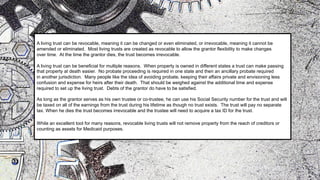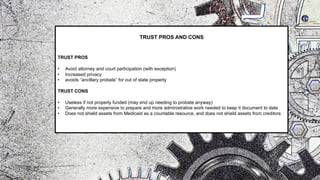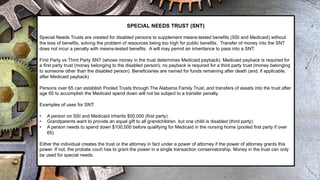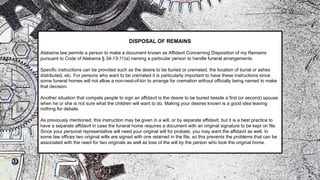This document provides an overview of estate planning documents and alternatives for arranging authority during disability or death if advance directives are not created. It discusses advance directives, powers of attorney, living wills, do not resuscitate orders, trusts, wills and court appointed guardians/conservators. It explains the differences between older and newer powers of attorney signed before and after 2012. It also summarizes alternatives like springing powers of attorney, naming agents, revoking documents, and certification of healthcare decision surrogates.
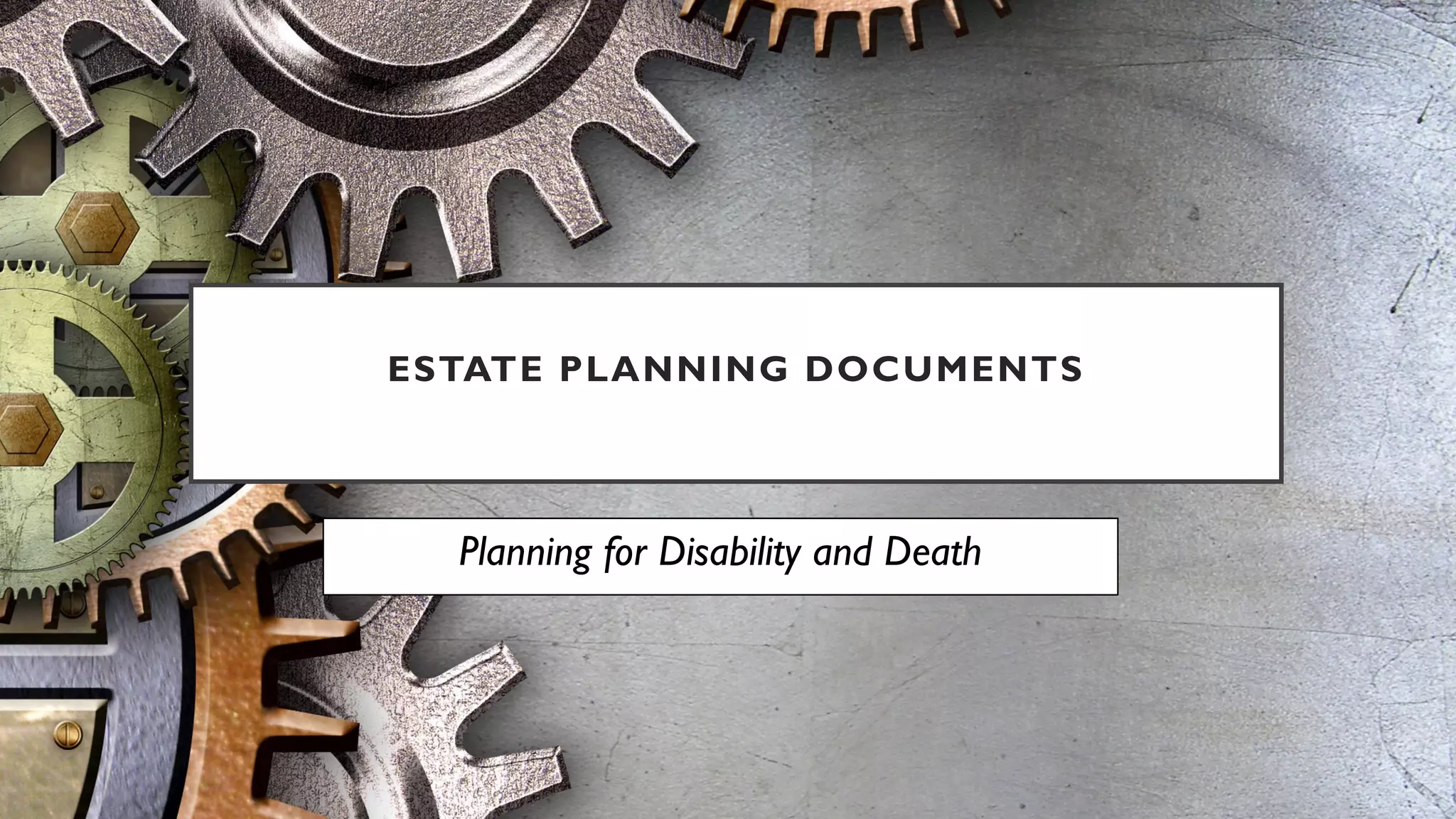


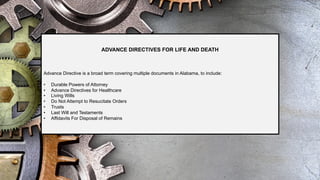
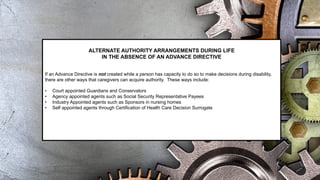

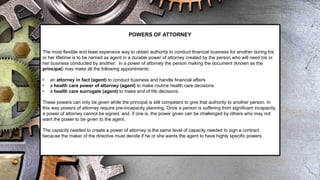
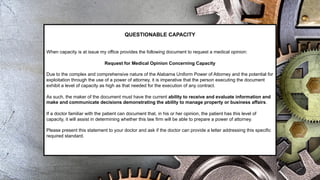
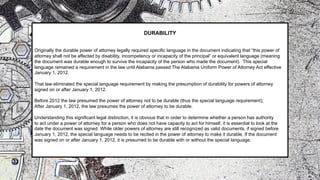
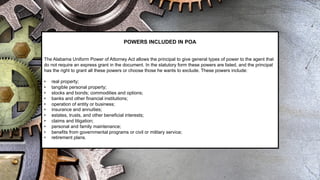

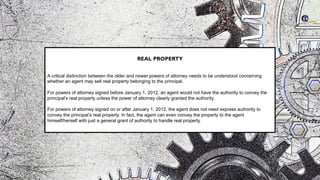
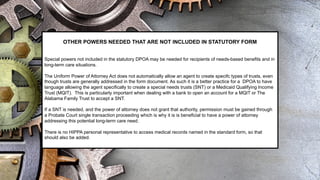
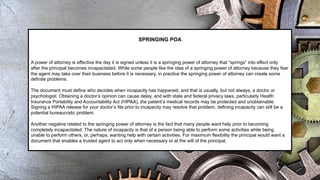
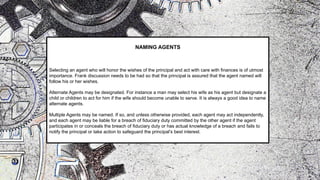
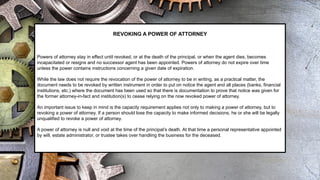
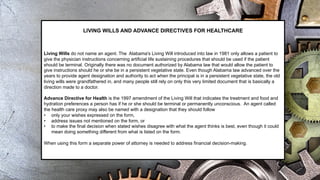
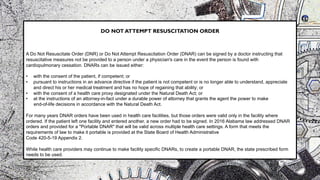
![COURT APPOINTED GUARDIANS
When a person fails to make an advance directive, and action needs to be taken, the family or the state (via The Department of Human
Resources [DHR]) has no option other than to have a legal representative appointed by the court.
The Probate Court can appoint a person known as the guardian to have authority over the body of an "incapacitated person" defined in
the Alabama Uniform Guardianship and Protective Proceedings Act as:
"any person who is impaired by reason of mental illness, mental deficiency, physical illness or disability, physical or mental infirmities
accompanying advanced age, chronic use of drugs, chronic intoxication, or
other cause (except minority) to the extent of lacking sufficient understanding or capacity to make or communicate responsible
decisions.”
The law provides a priority list of those the court should first appoint as guardian. They include:
• a person named in a durable power of attorney,
• spouse or spouse's nominee,
• adult child,
• parent or parent's nominee,
• relative with whom the person has lived the prior six months, and
• nominee of the caretaker of the person.](https://image.slidesharecdn.com/estateplanningdocuments-221102175323-f41b55af/85/Estate-Planning-Documents-pdf-19-320.jpg)
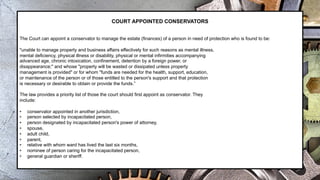
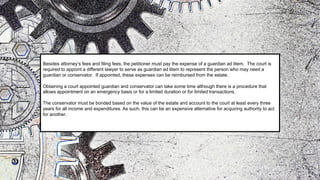
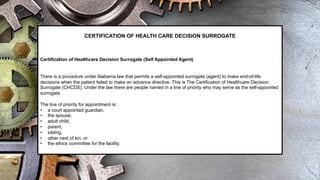
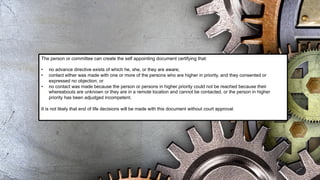
![SIX WAYS TO PASS PROPERTY AT DEATH
We normally only think of wills or trusts as a way to pass property at death, but there are actually multiple ways, and all of
those arrangements need to be considered and integrated into the estate plan when creating a will or trust. These transfer
methods include:
• By contract property may be left to beneficiaries (e.g. insurance, payable on death [POD] bank accounts beneficiary of an
investment account or IRA, Transfer on Death [TOD] registration for securities)*
• Types of joint ownership (joint owners on a bank account or real estate owned as joint tenants with right of survivorship
• Life estate deeds
• A trust funded during life
• Through the estate by probate of will, administration of estate when no will exists or small estate summary distribution for
probate property
• By affidavit of car title to next of kin when probate is not necessary (Alabama Department of Revenue MVT 5-6)
* note that If you are married, federal law automatically makes your spouse the beneficiary of your
401k. To name a beneficiary other than the spouse, the spouse must sign a waiver.](https://image.slidesharecdn.com/estateplanningdocuments-221102175323-f41b55af/85/Estate-Planning-Documents-pdf-24-320.jpg)
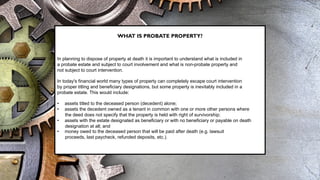
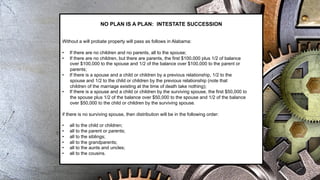
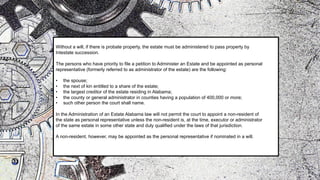


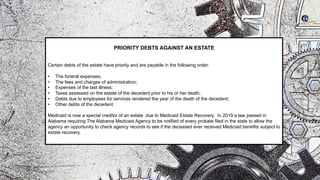
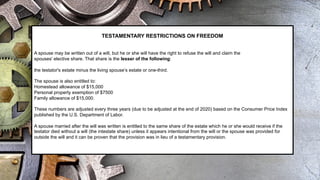
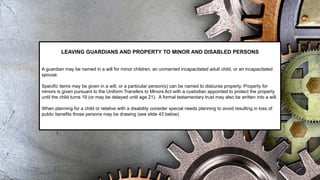
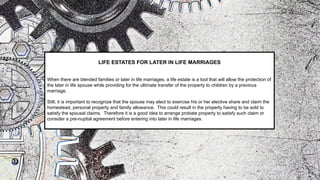
![WHAT TO INCLUDE IN A WILL
A will can be a fairly flexible document tailored to meet the specific concerns of the person making the will, however there
are some general issues most wills need to address:
• who will be the beneficiary and alternate beneficiary of each probate asset (if joint gift, how should the beneficiaries own
the property?);
• if gift to children, if one predeceases, do the deceased child’s children take his or her share?
• whether gifts are outright or paid into a testamentary trust or to a custodian under the Uniform Gift to Minors Act (UGMA);
• specific identification of real property (Book and Page where deed is filed);
• if property is to be sold, whether it can be sold pending probate of the will and proceeds held until creditor claims satisfied;
• who receives anything not specifically named (referred to as rest, residue and remainder [RRR]);
• specific burial plots owned by the maker of the will (if not specified, plots do not pass by the will’s RRR at all, rather to the
heirs at law);
• person who will serve as personal representative and alternate;
• who, if any next of kin, is to be specifically omitted;
• waiver of bond and inventory;
• self proving (specific declaration before two witnesses and a notary).
Additional considerations include:
• affidavit concerning disposition of remains;
• arrangements for pets;
• digital assets.](https://image.slidesharecdn.com/estateplanningdocuments-221102175323-f41b55af/85/Estate-Planning-Documents-pdf-34-320.jpg)

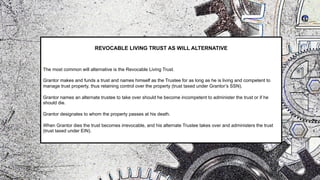
![FUNDING A REVOCABLE LIVING TRUSTS
Property must be titled to the trust for the trust to have any authority over the property. This is called funding the trust.
One would typically title his or her home, cars, and perhaps some investment or bank accounts to the trust. All too often
attorneys draw up estate-planning documents, advise clients to fund their trusts, and then nothing happens. Since trusts have
no relation to assets that are not retitled, the person may die without a will and an unfunded trust which, ultimately, is the same as
dying intestate with no enforceable instruction provided concerning distribution of property.
To place bank and investment accounts into a trust, those accounts need to be retitled as follows: “[your name and co-trustee’s
name] as Trustees of [trust name] Revocable Trust created by agreement dated [date].” Some institutions may allow the retitling
of an existing account, but it may be necessary to open a new account in the name of the trust and then transfer the funds. The
financial institution will require a copy of the trust.
You will need to execute a deed titling real property to the trust. One drawback to placing real property in the trust is the fact that
you will likely have to remove it from the trust if you want to refinance or take out a line of credit, because in many instances
banks and other lenders require that you remove the property from the trust and put it back in your name before signing any new
mortgage papers. You also need to reclaim homestead exemptions after transferring property into a revocable trust.](https://image.slidesharecdn.com/estateplanningdocuments-221102175323-f41b55af/85/Estate-Planning-Documents-pdf-37-320.jpg)

